by Daniel Hathaway
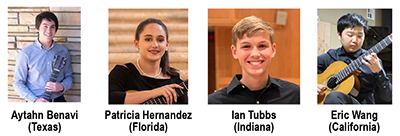
The contest goes on this weekend, thanks to digital technology. The four contestants who have advanced so far via preliminary video performances have sent in final round videos for streaming on Friday, October 16. After vetting by a panel of judges, prizes of $10,000, $5,000, $2,500, and $1,000 will be awarded.
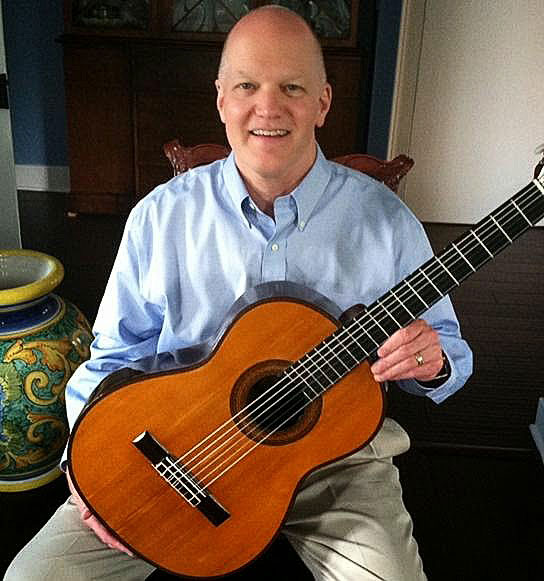
“There are great kids coming up. I knew that Armin Kelly’s Festival at CIM was the best in the country, I love Mixon Hall, and (CIM President) Paul Hogle was super responsive to the idea.” Then the virus hit. When Kelly postponed his 2020 Festival, Stroud decided to move his competition online.
On Friday, October 16 at 7:00 pm, the final round videos from the remaining four competitors will be broadcast on YouTube. The panel of judges — Stephen Aron, Mark Delpriora, Matteo Mela, Lorenzo Micheli, Nigel North, Marco Sartor, and Jason Vieaux — will rank the winners, to be followed by the announcement of prizes.
We caught up with the four finalists by telephone to learn more about them and chat about their final round programs.
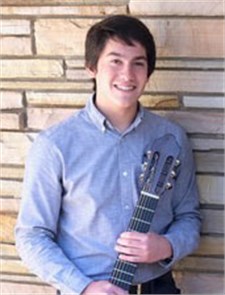
Years later, Aytahn was playing with two guitar orchestras in Austin, appeared on NPR’s From the Top, and composer Angelo Glardino offered to write a piece for him. “That’s a real honor for a sixteen-year-old kid,” he said. “It’s called The Joyful Island, and Debussy’s L’Isle joyeuse is the model.” Benavi will play it in the final round along with works by Dionisio Aguado and Vicente Asencio. “Asencio’s La Joia is a blast,” he said. “it’s in 6/8 time with lots of scales and runs and a melodic section in the middle full of Spanish lyricism.”
Benavi’s UT experience so far has been entirely virtual. “Everything since March has been a video.” That includes his performances for the Stroud Competition, which he has recorded at home. “I like doing that. After lots of takes, you can go hit tennis balls to take the edge off.” On the other hand, you can endlessly re-record the same piece, aiming for perfection. “That can become a really long process that takes forever. You just have to let go at some point.”
When we spoke, Benavi had just watched Novak Djokovic defeat Pable Carreño Busta in four sets at the French Open. “I’m a huge tennis fan. I was hoping that Busta could hang in there, but Djokovic is going to give Nadal a run for his money.”
Watch Benavi’s semifinal video submission here.
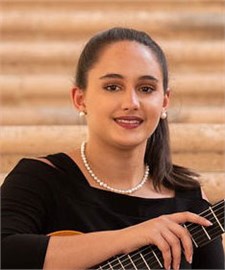
Hernandez has already recorded music by Dowland, Mertz, and Giuliani for her Stroud final round. “Playing for a camera has been challenging — you’re always thinking of the last take and the next one. I like trying to achieve perfection, but performing live for an audience creates a whole different energy.”
She remembers playing for Jason Vieaux in her very first master class. “It was an amazing experience, and exposed me to a lot.”
When not playing the guitar, Hernandez says she loves volleyball, singing, and school work — math and photography are her favorite subjects. During the lockdown, she said she worked out a lot and did some painting.
Does the classical guitar figure prominently in her future? “I’ll always play music, but I’m also interested in business and finance,” she said. Meanwhile, Hernandez misses performing and competing in person. “I love my fellow contestants. I hope we can resume physical performances soon and connect with people.”
Watch Hernandez’ semifinal video submission here.
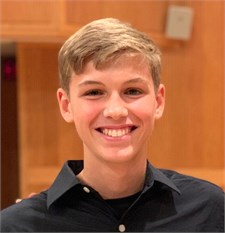
In his final round program, which he selected with the help of his teacher, Tubbs said “we tried to cover all the genres and include pieces that fit together but were different and contrasting.” That includes music by J.S. Bach, Mertz, Walton, and Koshkin, and he had already made his recordings when we spoke. “I recorded for four-and-a-half hours today — I had to finish that before a soccer tournament this week.”
Tubbs said that playing to the camera is a different kind of stress, though he prefers performing to a live audience. “It’s more exciting.”
While other contestants have had to adjust to various combinations of in-person and remote learning this fall, Tubbs has been relatively unaffected by the pandemic. “I’m home schooled, so not much is really different.” In addition to his soccer involvements, he likes “math and building things with legos, photography, and reading.” His tastes in photography lean toward pictures of flowers, trees, sunsets and sunrises, and he’s just finished reading Lord of the Rings. “I never before read it cover to cover.”
Watch Tubbs’ semifinal video submission here.
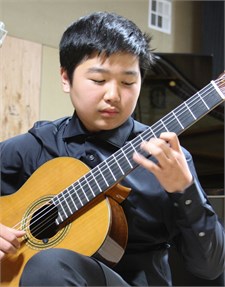
A veteran of many competitions who has also appeared on From the Top, Wang enjoyed planning his final round repertoire for the Stroud Competition. “The main factor was how much I liked the pieces, but I gave the program a coherent structure by playing the first movement of a Koshkin Sonata, the second of Bach’s Prelude, Fugue, and Allegro, and the last of Ponce’s Sonata Romantica.”
Wang went on to say more about his pieces. “Koshkin’s Sonata No. 2 has a dark, intimidating character, but parts are really heart-rending. I’ve loved the Bach fugue for a long time — it never stops and is purely beautiful. I just love Ponce’s music in general — it’s playful and emotional at the same time.”
When we spoke, Wang hadn’t finished recording his final round, which he planned to do over the weekend. How does it feel to play for nobody? “Well, there’s my dad, but it’s sometimes challenging to muster up musicality without an audience.”
One of Wang’s hobbies is astronomy, and he’s part of a research program at school, where the pandemic has resulted in hybrid classes this fall. “We go to school in person once a week. But the lockdown has been good because I could go outside and play soccer a lot, although the wildfires have prevented some of that.” Wang’s family wasn’t directly threatened, “but the air quality was pretty abysmal.”
Before we rang off, Wang wished good luck to his fellow competitors. “I hope it goes well for everyone.”
Watch Wang’s semifinal video submission here.
Published on ClevelandClassical.com October 13, 2020
Click here for a printable copy of this article



